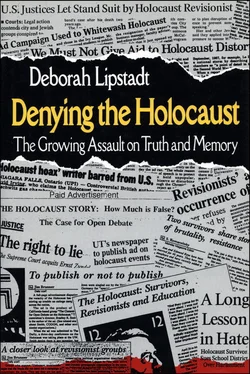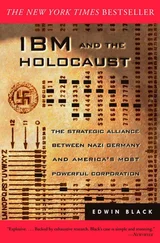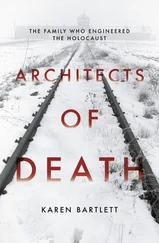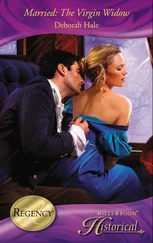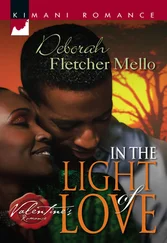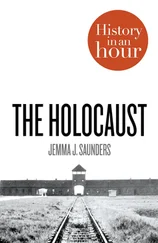New York Times, Mar. 12, 1987; Jennifer Golub, Japanese Attitudes Toward Jews (New York: American Jewish Committee, 1992), p. 6.
The Weekend Australian, Aug. 19–20, 1989; New York Times, Dec. 25, 1988; Time, Oct. 7, 1991.
Yehuda Bauer, “‘Revisionism’—The Repudiation of the Holocaust and Its Historical Significance,” in The Historiography of the Holocaust Period, Yisrael Gutman and Gideon Grief, eds. (Jerusalem, 1988), p. 702.
Los Angeles Times, Dec. 18, 1990.
Near East Report, Apr. 16, 1990, p. 72.
Interview with Robert Faurisson, Vichy, France, June 1989.
Jewish Telegraphic Agency, Nov. 26, 1992.
Esquire, Feb. 1983.
The Progressive, Apr. 1986, p. 4.
Peter Hayes, “A Historian Confronts Denial,” in The Netherlands and Nazi Genocide, G. Jan Colijn and Marcia S. Littell, eds. (Lewiston, 1992), p. 522.
Safet M. Sarich to Winnetka educators, May 1991.
New York Times, Jan. 1, 1981.
Gitta Sereny, “The Judgment of History,” New Statesman, July 17, 1981, p. 16; Noam Chomsky, “The Commissars of Literature,” New Statesman, Aug. 14, 1981, p. 13.
Noam Chomsky, “Chomsky: Freedom of Expression? Absolutely,” Village Voice, July 1–7, 1981, p. 12. See also Noam Chomsky, “The Faurisson Affair: His Right to Say It,” Nation, Feb. 28, 1991, p. 231. Gitta Sereny, “Let History Judge,” New Statesman, Sept. 11, 1981, p. 12.
Alfred Kazin, “Americans Right, Left and Indifferent: Responses to the Holocaust,” Dimensions, vol. 4, no. 1 (1988), p. 12.
He was particularly distressed by the University of Lyons’s decision not to let Faurisson teach because it could not guarantee his safety.
Statement by President H. Keith H. Brodie, Duke University, Nov. 6, 1991.
Fish argued that he was not in the business of “recovering” texts but “in the business of making texts and of teaching others to make them.” He found this a liberating approach because it relieved him of “the obligation to be right… and demands only that I be interesting.” Peter Novick, That Noble Dream: The Objectivity Question and the American Historical Profession (Cambridge, 1988), p. 544.
Nelson Goodman, Ways of Worldmaking (Indianapolis, 1978), cited in Novick, That Noble Dream, p. 539.
Richard Rorty, “Pragmatism, Relativism, and Irrationalism,” Consequences of Pragmatism (Minneapolis, 1982), p. 166. See also Novick, That Noble Dream, p. 540.
Hilary Putnam, Truth and History (Cambridge, 1981), p. 54.
Time, Aug. 26, 1991, p. 19.
Newsweek, Sept. 18, 1991, p. 47.
Charles Maier, The Unmasterable Past: History, Holocaust and German National Identity (Cambridge, 1988), p. 64.
Novick, That Noble Dream, pp. 448ff.
Mark Lane, letter to the editor, Los Angeles Daily Journal, Nov. 13, 1991.
Conversations with Robert Faurisson, Vichy, France, June 1989.
Harry Elmer Barnes, “Revisionism: A Key to Peace,” Rampart Journal (Spring 1966), p. 3.
Austin J. App, History’s Most Terrifying Peace, p. 106, cited in “Prevent World War III,” n.d., p. 7.
Harry Elmer Barnes, Revisionism and Brainwashing: A Survey of the War-Guilt Question in Germany After Two World Wars (n.p., 1962), p. 33 (hereafter referred to as Brainwashing).
Canadian papers covering the trial regularly carried headlines such as: “Nazi Camp had Pool, Ballroom” ( Toronto Sun, Feb. 13, 1985); “Prisoners at Auschwitz dined, danced to band, Zundel Witness Testifies” ( Toronto Star, Feb. 13, 1985).
Conversations with Robert Faurisson, Vichy, France, June 1989.
Maier, The Unmasterable Past, p. 64.
Colin Holmes, “Historical Revisionism in Britain, The Politics of History,” in Trends in Historical Revisionism: History as a Political Device (London, 1985), p. 8.
Dumas Malone, The Sage of Monticello, pp. 417–418.
Novick, That Noble Dream, p. 2.
Institute for Historical Review, Newsletter (Apr. 1987), p. 1.
New York Review of Books, Mar. 22, 1979, p. 47. See also Pierre Vidal-Naquet, Assassins of Memory, pp. 3–7.
Democracy, vol. 1–2 (Apr. 1981), pp. 73ff.
Justus D. Doenecke, “Harry Elmer Barnes: Prophet of a Usable Past,” History Teacher (Feb. 1975), p. 273.
Geoffrey Hartman, “Blindness and Insight,” New Republic, Mar. 7, 1988, pp. 26–31.
Donald Cameron Watt, “The Political Misuse of History,” in Trends in Historical Revisionism: History as a Political Device (London, 1985), P. 11.
Sidney B. Fay, “New Light on the Origins of the World War,” American Historical Review, vol. 25 (1920), pp. 616–39; vol. 26, (1920), pp. 37–53; vol. 26 (1921), pp. 225–54.
Sidney B. Fay, The Origins of the World War, vol. 2 (New York, 1966), pp. 552–54.
Novick, That Noble Dream, pp. 210ff.
Ibid., p. 212.
Charles Beard, “Heroes and Villains of the World War,” Current History, vol. 24 (1926), p. 733.
Fay, Origins of the World War, vol. 1, p. 8.
Harry Elmer Barnes, The Genesis of the World War: An Introduction to the Problem of War Guilt (New York, 1929), p. 641.
For analysis of the evidence placed before the Commission on Responsibility for the War at the Paris Peace Conference and the conclusions based on it see A. von Wegerer, “Die Widerlegung der Versailles Kriegsschuldthese” (Refutation of the Versailles war guilt theory), in Die Kriegsschuldfrage (The war guilt question), vol. 6 (Jan. 1928), pp. 1–77; see also his article and the replies to it in Current History (Aug. 1928), pp. 810–28, cited in Fay, Origins of the World War, vol. 2, p. 549.
Barnes, Genesis, pp. 641–42.
Читать дальше
